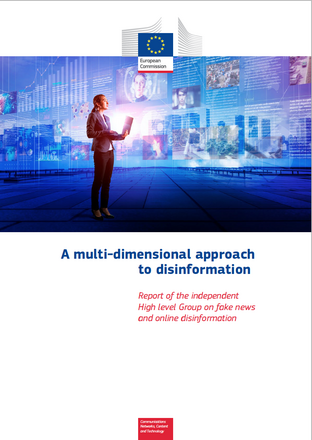
In this Report, issued on March 2018, experts - with different background ranging from academia to journalism and civil society - start from a shared understanding of disinformation as a phenomenon that goes well beyond the restrictive and misleading term “fake news” in line with the recommendations of the Council of Europe’s report “Information Disorder: an Interdisciplinary Framework for Research and Policy Making”.
The authors clarify that disinformation includes all forms of false, inaccurate, or misleading information, designed to intentionally cause public harm or for profit. The Report acknowledges that, while not necessarily illegal, disinformation can nonetheless be harmful for citizens and society at large. According to the experts, the best responses to disinformation are multi-dimensional, with stakeholders collaborating in a way that takes into account and protect fundamental values and rights, in particular freedom of expression, media freedom, and media pluralism.
The recommendations proposed provide short-term responses to the most pressing problems, as well as longer-term responses to increase societal resilience to disinformation. Specifically, the multi-dimensional and multi-stakeholders approach recommended by the HLEG is based on a number of interconnected and mutually reinforcing responses. Such responses rest on five pillars which aim to:
-enhance transparency of online news, also by means of a privacy-compliance sharing of data about the mechanisms that enable their circulation online; increased transparency of funding sources; independent fact-checking practices, and algorithmic transparency;
-promote media and information literacy to counter disinformation and help users navigate and understand the digital media environment, including by means of adjustment of national educational policies, and programmes for citizens of all ages;
-develop tools to empowering users and journalists to tackle disinformation, also by means of dedicated online tools for user empowerment, professional automatic content verification tools for journalists and newsrooms, and training for journalists;
-safeguard the diversity and sustainability of the European news media ecosystem at both European and national level, by supporting quality journalism and innovation in journalism;
-promote continued research, monitoring and evaluation on the impact of disinformation in Europe.
Within this broader framework, for the short-medium term the HLEG suggests, as a first step, a self-regulatory approach, based on a clear multi-stakeholders engagement and on a Code of Practices to which online platforms, news media organisations, journalists, fact-checkers, independent content creators and the advertising industry are all called upon to commit. The HLEG has formulated 10 key principles to be enshrined in the Code that will be elaborated by a Coalition representing the relevant stakeholders. Given the absence of relevant codes of practices applicable to platforms, the HLEG’s 10 principles focuses mainly on platforms. Such principles include issues dealing with transparency in the advertising policies, transparency with regard to the use of users’ data for advertising placements and respect for privacy, freedom of expression and media pluralism; transparency on sponsored content; access to platforms’ data for fact-checking and research activities; improvement of the visibility of reliable, trustworthy news; promotion of links to fact-checking sources. As regards media organisations, it is proposed that the Code refers to the existing journalism deontological codes, ethics and standards.
In the longer term, the HLEG recommend measures aimed at strengthening societal resilience to online disinformation, supporting the diversity and sustainability of the news media ecosystem, and developing initiatives in the field of media and information literacy to foster a critical approach and a responsible behavior across all European citizens.
Moreover, the HLEG asks EU and national authorities to support the development of a network of independent European Centres for research on disinformation. The establishment of an independent Centre of Excellence will also be considered.
Finally, the Report concludes that an intermediate evaluation of the effectiveness and efficiency of these short and medium-term measures should then lead the Commission to re-examine the matter in Spring 2019, with a view to deciding whether further measures, including (co)regulatory interventions, competition instruments or mechanisms to ensure a continuous monitoring and evaluation of self-regulatory measures, should be considered for the next European Commission term.
Tags: Fake news and disinformation EU Member States TransparencyThe content of this article can be used according to the terms of Creative Commons: Attribution-NonCommercial 4.0 International (CC BY-NC 4.0) . To do so use the the wording "this article was originally published on the Resource Centre on Media Freedom in Europe" including a direct active link to the original article page.

